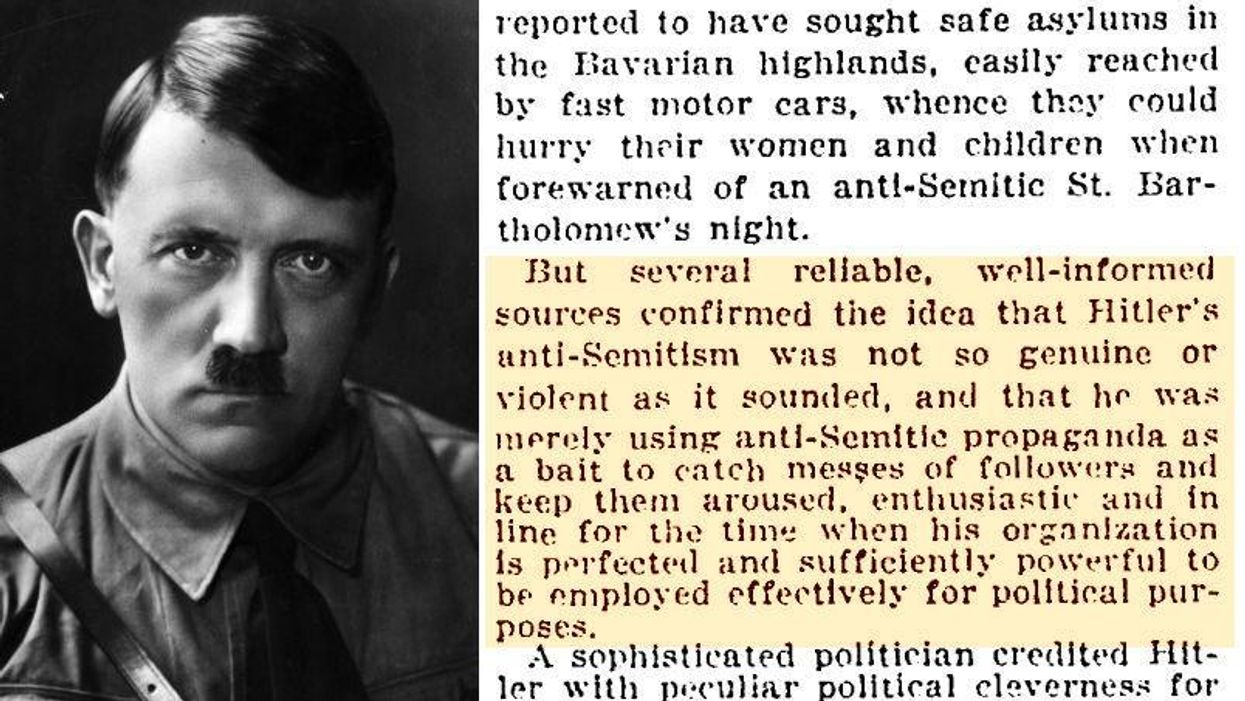News
Joe Vesey-Byrne
Nov 12, 2016

Picture:
left: Heinrich Hoffman/Getty, right: New York Times
Aside from dismay and sadness, when Donald Trump was elected president, his opponents responded to his victory in two ways:
- They believed he was a cynic, and used nationalism and anti-immigration sentiment to swindle votes.
- Or, he believes every word of his own spin, and has big authoritarian plans for America, and discriminatory policies for her minorities.
Those in the latter category believed the former were dramatically under-reacting.
Both think the other is underestimating Trump, who to their credit has been the most mis-underestimated candidate since George W Bush.
An article from the New York Times archive from 21 November 1922 regarding Adolf Hitler, led many to worry about the dismissiveness towards Trump's discriminatory words.
Reporting on the popularity of the Nazi Party in the German region of Bavaria, reporter Cyril Brown claimed that worries about their rhetoric were overblown.
Brown was an American foreign and war correspondent who, by 1922, served as the paper's Berlin bureau chief.
Several passages from the short article sound unsettlingly familiar to Americans who believe in the cyclical nature of history.
Another condition favourable to the outburst of the movement is the widespread discontent with the existing state of affairs among all classes in the towns and cities under the increasing economic pressure.
He is a man of the 'common people' and hence, has the makings of a 'popular hero' appealing to all classes.
His program consists chiefly of half a dozen negative ideas clothed in generalities... He probably does not know himself just what he wants to accomplish.
He talks rough, shaggy, sound horse sense, and according to... public opinion, a strong, active leader equipped with horse sense is the need of the hour.
One should bear in mind that once a Trump-1920s nationalism pattern is suggested, otherwise innocuous quotes will take on such an interpretation as to fit the pattern.
This problem of history is not unlike cold reading by fraudsters, or what's known in psychology as confirmation bias.
Yet beyond this sequence of unsettling remarks, the New York Times reporter of the day does make reference to a similar 'He's a cynic' argument, held by observers of Hitler in 1922.
The article details the regional popularity of the movement, its violent characteristics and Hitler's abilities as a public speaker (as if alliteration is excuse enough for anti-Semitism) but then cautions against taking Hitler's rhetoric seriously.
But several reliable, well-informed sources confirmed the idea that Hitler's anti-Semitism was not so genuine or violent as it sounded, and the he was merely using anti-Semitic propaganda as a bait to catch masses of followers and keep them aroused, enthusiastic and in line for the time when his organisation is perfected and sufficiently powerful to be employed effectively for political purposes.
Indeed, the report goes on to quote an anonymous statesman of the day's own perceptions of Hitler's intentions.
A sophisticated politician credited Hitler with a peculiar political cleverness for laying emphasis and over-emphasis on anti-Semitism, saying: 'You can't expect the masses to understand or appreciate your finer real aims. You must feed the masses with cruder morsels and ideas like anti-Semitism. It would be politically all wrong to tell them the truth about where you are really leading them.
The article resurfaced 10 February 2015 when the New York Times re-released it, as it was the first article they had ever printed regarding Hitler.
It was followed by comparisons to Trump's then much derided primary campaign.
Trump's victory in the polls prompted many would-be Cassandras to share the New York Times article.
More: Two quotes that show just how much of a stinking hypocrite Donald Trump is
More: Show this chart to anyone who says Trump was the 'American people's choice'
Top 100
The Conversation (0)













